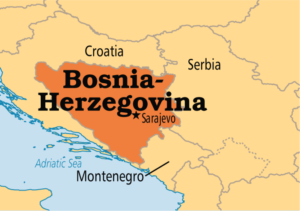The Red Heifer Offering- Numbers 19
The “red heifer” sacrifice is unique. It is mentioned only once in the Old Testament. The ashes from this slaughtered animal are to be taken to a ceremonially clean place. There the ashes were to be mixed with the water and sprinkled on the third and seventh day of the seven-day purification process required when anyone is rendered unclean by coming in contact with the dead.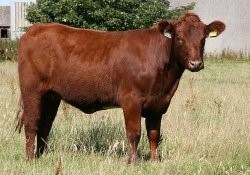
A heifer is a young female cow before she has had her first calf. Unlike the offering of bulls and goats which must be offered continually (Hebrews 10:1-4), the red heifer offering is a singular offering representative of the once and for all sacrifice of Christ that has ongoing efficacy for cleansing. Its ashes serve as evidence that the sacrifice has been fully consumed and atonement has been provided for. This proof is mixed with water (a type of the Word of God –John 15:3; Eph 5:26) and administered by the Holy Spirit (John 7:38-39).
According to Numbers 19, the heifer must fulfill several conditions:
- It must be unblemished and without defect– a type of the sinlessness of Jesus Christ.
- It must never have been under any yoke– which is a type of Jesus not being a slave of Satan, the god of this world (Eph 2:2; 2 Cor 4:4, John 14:30). He also did not commit himself to man because he knew what was in man (John 2:24). Instead, He committed Himself to the Father to be what He had planned for Him to be for man- the perfect substitutionary sacrifice.
- The actual hide of the heifer and not just the hair must be red. Red signifies sin- “Though your sins be as scarlet they shall be as white as snow, though they be red like crimson, they shall be as wool.” (Isaiah 1:18). This reminds us of Jesus being identified with sin on the outside while remaining pure on the inside. “God made Him who knew no sin to be sin on our behalf, so that we might become the righteousness of God in Him.” Corinthians 5:21 (NASB)
- The red heifer had to be burned outside the camp. “Jesus also, that He might sanctify the people through His own blood, suffered outside the gate” (Hebrews 13:12).
The blood of this sacrifice is sprinkled seven times from the finger of the priest in front of the Tent of Meeting. The number 7 means ‘enough’ meaning that it is sufficient. The raised finger indicates the number 1. It is one sacrifice, sufficient for all.
The burning of the red heifer is also different from other sacrifices. The priest casts cedarwood, hyssop, and scarlet into the midst of the fire as the offering is being consumed. This indicates that the offering is for all of creation. Solomon wrote of all creation “from the cedar…even to the hyssop” (1 Kings 4:33-34).
Scarlet represents sin, and Jesus died for the sins of the whole world.
1 John 2:2 (NASB) 2 and He Himself is the propitiation for our sins; and not for ours only, but also for those of the whole world.
So, the offering of the red heifer stands for the perfect, once and for all sacrifice of Christ.
Hebrews 10:10 (NASB) 10 By this will we have been sanctified through the offering of the body of Jesus Christ once for all.
Hebrews 10:14 (NASB) 14 For by one offering He has perfected for all time those who are sanctified.
The communication of this truth for the ongoing purification of believers is illustrated by the application of the water of purification that contains the remaining ashes after the red heifer has been burned outside the camp.
The sacrifice is not repeated when we need purification. Its efficacy is applied. The word of the cross is received by faith.
John 15:3 (NASB) 3 “You are already clean because of the word which I have spoken to you.
Romans 10:17 (NIV) 17 Consequently, faith comes from hearing the message, and the message is heard through the word of Christ.
Ephesians 5:26 (NASB) 26 so that He might sanctify her, having cleansed her by the washing of water with the word,
The water of the word declares the efficacy of the once and for all sacrifice and bears witness to the fact that the blood of Jesus Christ cleanses us from all sin.
1 John 1:7 (NASB) 7 but if we walk in the Light as He Himself is in the Light, we have fellowship with one another, and the blood of Jesus His Son cleanses us from all sin.
We know that our old man has been crucified with Christ.
Romans 6:6 (NASB) 6 knowing this, that our old self was crucified with Him, in order that our body of sin might be done away with, so that we would no longer be slaves to sin.
Whenever we touch something of the old man, Adam, we become defiled and need to be cleansed. Our need for cleansing does not necessitate the repetition of Jesus’ perfect sacrifice. It requires that the truth of the efficacy of His once and for all sacrifice, evident in the precious blood of Christ, needs to be applied to our lives through the water of the Word by the Spirit.
1 John 1:9 (NASB) 9 If we confess our sins, He is faithful and righteous to forgive us our sins and to cleanse us from all unrighteousness.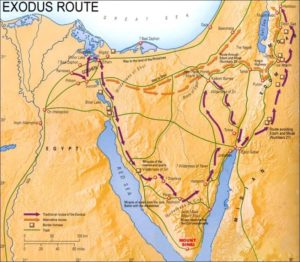
The story of the first generation of Israelites in the wilderness is drawing to a close. Numbers Chapters 15-19 describe the 38 years of wandering, of the total of 40 years of the journey, from the Exodus to the Promised Land. By the time the children of Israel are ready to cross the Jordan River into Canaan, all those who had been over 20 years of age at the time when the twelve spies were sent out from Kadesh Barnea, would have died. In the last 38 years they would have come full circle, arriving back where they started, the place where they originally gave credence to the faithless report of the ten spies who defied Joshua and Caleb’s report that the Lord was able to deliver their enemies into their hands.
The nation of Israel has received a 38-year chastisement for their unbelief. An entire generation forfeited their right of entry into the Promised Land.
In Numbers chapter 20, both the death of Miriam and Aaron are recorded (Numbers 20:1, 28).
Unbelief is now revealed in Moses. You will remember that 38 years earlier at Mount Horeb, in the Wilderness of Sin, Moses was commanded to strike the rock (the Hebrew word ‘sela’ indicates ‘a cliff’ and not a ‘boulder’) with his staff (Exodus 17:1-7). This first striking of the rock was a clear picture of Christ (our Rock- 1 Cor 10:4) being “smitten of God” (Isaiah 53:4), punished by the rod of Divine justice so that sin would be atoned for. The result of justice being satisfied was water issuing forth from the Rock, which speaks of the life of Christ ministered by the Holy Spirit (John 7:38-39).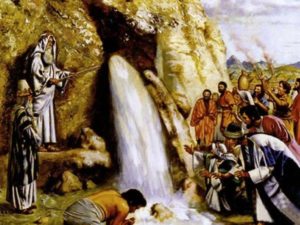
In the incident recorded in Numbers 20:8 Moses is told to:
“Speak to the Rock before their eyes, that it may yield its water.”
Moses disobeys this command and misrepresents God both in attitude and action. In the heat of his frustration, Moses reprimands the people saying, “Listen now, you rebels; shall WE bring forth water for you out of this rock?” (Numbers 20:10).
10 For if while we were enemies we were reconciled to God through the death of His Son, much more, having been reconciled, we shall be saved by His life. (Romans 5:10) (NASB)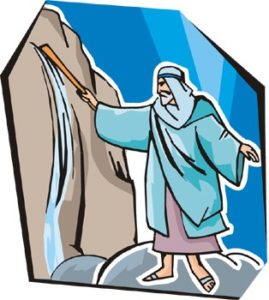
Moses misrepresents God in what he says. The water was not to be fetched, nor was Moses called to fetch it. The rock would yield water once spoken to. Whereas the first incident with the “Smitten Rock” represents “Christ crucified” by whom we are reconciled to God. The second incident with the “Living Rock” represents that very same Jesus, risen, glorified, and at the right hand of the Father (Hebrews 10:12) by whose indwelling life we shall be saved (Romans 5:10). The same Jesus that died for us, rose from the dead, ascended to the Father, to live in us, by the Holy Spirit. We can speak to the Rock. We can speak to the Living Rock to make our requests known; our access having been purchased at the cross.
Moses lifts up his hand and strikes the rock twice with his rod. This is not what God asked him to do. He who was smitten for us needs not to be smitten again!
14 For by one offering He has perfected for all time those who are sanctified. (Hebrews 10:14; NASB)
Moses also takes credit for bringing water to the people. He said, “Shall we bring forth water for you out of this rock?” (Numbers 20:10). This is another distortion of the real truth.
In this incident of testing, known as “the waters of Meribah”, the Lord proves Himself to be holy. Moses would not bring the assembly into the Promised Land. God’s sovereign hand is seen in this as Moses who represents the Law, can only point to the Promised Land. The Law cannot bring anyone into it.
3 For what the Law could not do, weak as it was through the flesh, God did: sending His own Son (YESHUA- of whom JOSHUA will be a type). Romans 8:3 (NASB)
NEW TESTAMENT READING: LUKE 1:1-25
Dr. Luke, the physician, prepares his two New Testament writings, His Gospel and the Book of Acts, for a gentleman named Theophilus. Many scholars believe that Theophilus was the attorney working for Paul’s defense, while Paul was imprisoned in Rome. Luke had been a member of Paul’s first missionary trip to Macedonia, joining him when he sailed from Troas to Philippi (Acts 16:11). Both Luke’s Gospel and the Book of Acts would furnish the Roman authorities with an accurate account of the life and ministry of Jesus Christ and the aftermath of Christ’s resurrection that spread Christianity across the Empire.
In his second volume, the Book of Acts, Luke references this gospel.
Acts 1:1-2 (NASB) 1 The first account I composed, Theophilus, about all that Jesus began to do and teach, 2 until the day when He was taken up to heaven, after He had by the Holy Spirit given orders to the apostles whom He had chosen.
Luke is a first-rate historian as he carefully anchors events in their historical setting. He gives specific details referencing the locations and families of the people he writes about so that his account can be easily investigated for accuracy. He is also careful to show that Christianity was not a political movement designed to topple Rome, but that it was a movement God provided to topple the rule of sin in the heart.
Luke has a more exhaustive record of Jesus’ teaching than the other gospels. Luke has 17 parables that are unique to his account. He also records seven miracles that are not recorded in the gospels of Matthew or Mark.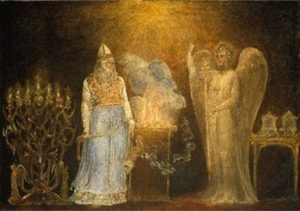
Luke begins his gospel narrative with the story of Zacharias, who receives word from Gabriel, an angel of the Lord, that his wife, Elizabeth would bear him a son, whom he is to call John. This son, born in their old age, will be the prophesied forerunner of the Messiah, fulfilling what was promised in Isaiah 40.
Isaiah 40:3 3 A voice of one calling: “In the desert prepare the way for the LORD; make straight in the wilderness a highway for our God.”
He would be the one foretold in the final prophecy of the Old Testament, given in Malachi 4:6.
Luke 1:17 (NIV) 17 And he will go on before the Lord, in the spirit and power of Elijah, to turn the hearts of the fathers to their children and the disobedient to the wisdom of the righteous–to make ready a people prepared for the Lord.”
Zacharias finds this promise incredible. As a sign that this would come to pass, Zacharias is told that he will be struck silent until the day when these things take place.
READING FROM PSALMS – Psalm 56:1-13.
This Psalm was written during a very difficult time in David’s life when he was taken by the Philistines in Gath.
Psalm 56:1 (NIV) 1 Be merciful to me, O God, for men hotly pursue me; all day long they press their attack.
He was naturally fearful for his safety.
Psalm 56:3-4 (NIV) 3 When I am afraid, I will trust in you. 4 In God, whose word I praise, in God I trust; I will not be afraid. What can mortal man do to me?
He speaks to his fears, announcing the trustworthiness of God.
Notice that he makes a choice: I will trust. I will not be afraid.
Some have said that fear is faith in reverse. David knew he had to change gears. He had to engage with God in faith instead of giving way to his emotions.
TODAY’S PROVERB:
Proverbs 11:8 (NIV) 8 The righteous man is rescued from trouble, and it comes on the wicked instead.
PRAY FOR THE NATIONS
Bosnia and Herzegovina
Europe
Area: 51,129 sq. km
Mountainous Balkan state bracketed by Serbia, Montenegro and Croatia.
Population: 3,759,633 Annual Growth: -0.11%
Capital: Sarajevo
Urbanites: 48.6%
HDI Rank: 76 of 182 (UN Human Development Reports 2009)
The war of the early 1990s devastated Bosnia and shattered its fragile agrarian infrastructure. Massive population movements, wholesale destruction and disruption of communications sank the economy further. Foreign aid is still important as is rebuilding the infrastructure; tourism is growing in importance.
Challenge for Prayer
The post-war socio-economic situation is troubled, and recovery is slow. A poor country even before the strife, Bosnia still struggles with poverty. Only organized crime syndicates do well for themselves; these groups must be shut down if Bosnia hopes to join the EU with all the accompanying financial rewards. Young people, in particular, are pessimistic – more than 60% want to leave the country; the brain and youth drains further sap Bosnia’s potential. Pray for economic transformation, and for a new generation of Bosnians to lead their nation into a bright future rather than flee a sinking ship.
Religious communities are as entrenched as ever and deeply divided along ethnic lines. Orthodoxy has been subverted by Serb nationalism and Catholicism by Croat nationalism. All groups view Protestants and independents suspiciously. Pray for the Spirit to move powerfully among the churches and for Christians to realize that their citizenship lies first in heaven.
PRAYER: O Lord of Life, You have redeemed us from the curse of death. Cleanse us from our correspondence with the old sin nature. Wash us with the declaration of the Finished Work of Christ! Help us to yield in obedience to the Holy Spirit, and put to death the selfish preoccupations of our old sin nature. Our souls sing with the words of the Psalmist: “When we are afraid, we will make a choice. We will put our trust in You, rather than our emotions. We will praise You, the Living Word of God, because Your Word is truth! Therefore, we need not be afraid. What can mere man do to us? Our confidence is in You! In Jesus’ Name. Amen.

